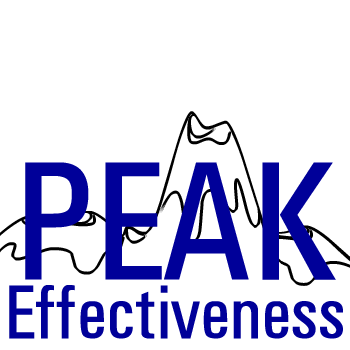






|
|
|
|
|
|
Get Engaged – At
Work and In Life!
Target or Niche Marketing -
What is the Specific Target Audience You
Will Sell To?
We have all heard hundreds of times that we need to "target our market". Do you?
What is targeting your market?
Why should you target your market?
What do you do with your target audience?
How do you reach your target audience?
What is targeting your market?
Your target audience is a very narrowly defined subsegment of the total population that have characteristics in common.
It is important to clearly identify the market segment or niche that you will market to. To sell to "small businesses" or to "females" is not refined enough. What kind of small businesses? Where are they located? How small? What age females? With what interests? Etc. You need to be specific, otherwise you cannot develop your focused marketing initiative.
Does "homeowners" qualify? Well, it is not the entire population, but it is still far too broad. Can you define it geographically? By age? Number of residents? With or without children? Those without steel or vinyl siding? Single story? Accountants? You get the picture. Be specific. Ask the old questions: who, what, when, where, why, which, what kind of, how many? Find a niche.
How about "businesses on the web"? Again, too broad. Even the question "where" can be applied to the internet as it may be businesses on Xoom, or at Yahoo!, or MSN. Narrow down your focus.
The size of the niche you choose is critical. It must be large enough to have sufficient prospects to be able to generate enough sales to make any money. At the same time, it must not be so large as to be meaningless. Wow! Thanks a lot, hey! That narrows it right down. :))) Sorry, it cannot be easily stated in more specific terms that are meaningful when applied to specific markets.
Whereas, in the physical world, niches are based on geography, geography is almost irrelevant on the Internet. One way to look at niche marketing is to think that niches on the Internet are based on what you sell, not where you are. And whatever you sell, you have to be the place to buy it, because your competitors are just an easy click away.
Perhaps the better way is to think of your niche market as a small segment of people, for whom you will be finding and offering solutions to their problems, and your current product or service just might be one perfectly suited to this targeted group of people.
Experts in direct mail market use techniques such as "psychographics" to segment the market by shared characteristics. Research has shown that people with similar demographics tend to hold similar beliefs. You may try to segment a market based upon shared personal values, ideals or beliefs.
You may start your thinking of niche markets of people, professions or subject matters you already know. Are there specialty areas within your industry or within your expertise that you might identify and service better than anyone is doing now? Who works in that specialty area? Where are the located? Where do they go on the Internet? Where can you find them offline? What are their special problems?
Why should you target your market?
None of us have unlimited resources of time and money. To get the best results, we want to focus that time and money where it will do us the most good. Experienced marketers have learned that you get the best response when you offer something that the person is interested in. (Wow, this business stuff is tough, isn't it?)
We are all inundated with advertising today. We simply screen out everything except that which interests us. As marketers, we need to send very specific messages that will be of interest to our target audience.
Don't be afraid to narrow down your target market. The wider your target - the less you can focus on the specific needs of your customers. With a wide target you speak to them in generalities. People don't like general and universal talk - they don't respond to it. They respond only when they feel that you are talking with them, about them, and about their needs. When you try to talk to everyone, you actually talk to no one.
Choose a niche small enough that you can dominate it.
If we can send our sharply focused message to people who identify with the message, and catch their attention, the chances of a favorable response is much greater. Marketing is ultimately a numbers game, with varying probabilities of success, depending on the methods used. You do want to maximize the chances of your success, don't you?
(Oops, the cynic in me showed through. Actually, marketing is a people game - helping people identify and clarify their problems and providing solutions to enhance people's lives.)
What do you do with your target audience?
You find out what is of interest to them, and you craft your offerings to those interests. You develop your Unique Selling Proposition (USP) that uniquely qualifies you to be the source of help to them or source of solutions to their problems.
How do we find out what is of interest to them or what their needs are? Well, there are two basic ways.
- The first is so simple that most businesses overlook it: go
ask them. Tom Peters, in his book, "In Search of
Excellence" was astounded by the number of businesses that do not
do this. Our asking will be of little value, however, if we just
go ask "homeowners" if we wish to sell vinyl siding to
middle aged, middle class owners of aging naturally sided homes in the
Detroit, Michigan area who work for Ford on the assembly line.
- The second is to try many different messages, measure the responses and eventually you may find out what works best, and by deduction, conclude that whatever it is that they are responding to must be what interests them. If you are lucky! This is a tremendous waste of time and money, but this is exactly what many businesses do. No wonder so many new businesses fail within the first five years.
Some marketers take the first approach to a next logical step. They believe that you need to identify a narrowly defined target market, and then find out what that group ultimately wants and needs. Then and only then, do you go find the solutions to the target market problems and offer those to the group. Wow! That is a total reversal from the way most businesses work - "This is what we make. Now who are we going to find who will buy it?"
How do you reach your target audience?
You find out where your target audience hangs out. Where do they live, work, and play? What do they read? Where do they go on the Internet? Then go there.
In many cases, it can be quite obvious. For example, if you have golf clubs for sale, which group of people do you think is more interested in your golf clubs: readers of Golf Digest, readers of Field and Stream, or readers of Family Circle? (Sorry, I gave the answer away by placing it first on the list!)
Other times, for some products or services, it is not so clear. So identify some people who use that product or service (such as your current customers) and go ask them.